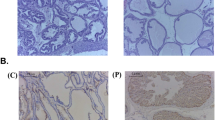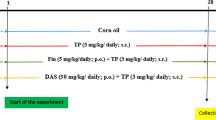Abstract
Metabolic syndrome (MetS) is an immense health issue that causes serious complications in aging males including BPH. Icariin (ICA) is a flavonol glycoside that exerts a plethora of pharmacological effects. The present investigation tested the potential of ICA to ameliorate benign prostatic hyperplasia (BPH) induced by MetS in rats. Animals were allocated to 5 groups in which the first and second groups were kept on water and regular food pellets. MetS was induced in the third, fourth, and fifth groups by keeping the animals on high fructose and salt diets for twelve consecutive weeks. These groups were given vehicle, ICA (25 mg/kg), and ICA (50 mg/kg), respectively. MetS was confirmed by an increase in rats’ weight, accumulation of visceral fat, insulin resistance, and dyslipidemia. This was accompanied by manifestation of BPH including increased prostate weight, prostate index, and histopathological alterations. Treating the animals with both doses of ICA significantly ameliorated the increase in weight and index of the prostate as well as altered prostate histopathology. In addition, ICA significantly decreased cyclin D1 expression, upregulated Bax, and downregulated Bcl2 mRNA expression. ICA prevented lipid peroxidation, reduced glutathione depletion, and catalase exhaustion, which further lowered markers of prostate inflammation such as interleukin-6 and tumor necrosis factor-α. Moreover, ICA prevented the decrease in prostate content of phosphorylated 5′-adenosine monophosphate (AMP)-activated protein kinase (pAMPK). In conclusion, ICA protects against MetS-induced BPH. This is due to its antiproliferative, proapoptotic, antioxidant, and anti-inflammatory activities as well as the activation of AMPK.





Similar content being viewed by others
Data availability
All data generated or analyzed during this study are included in this published article.
References
Aaron-Brooks LTM, Sasaki T, Vickman RE et al (2019) Hyperglycemia and T cell infiltration are associated with stromal and epithelial prostatic hyperplasia in the nonobese diabetic mouse. Prostate 79:980–993. https://doi.org/10.1002/pros.23809
Abdallah HM, El-Bassossy HM, Mohamed GA et al (2016) Phenolics from Garcinia mangostana alleviate exaggerated vasoconstriction in metabolic syndrome through direct vasodilatation and nitric oxide generation. BMC Complement Altern Med 16. https://doi.org/10.1186/s12906-016-1340-5
Alhakamy NA, Fahmy UA, Badr-Eldin SM, et al (2020) Optimized icariin phytosomes exhibit enhanced cytotoxicity and apoptosis-inducing activities in ovarian cancer cells. Pharmaceutics 12https://doi.org/10.3390/pharmaceutics12040346
Aljehani AA, Albadr NA, Eid BG, Abdel-Naim AB (2020) Icariin enhances AMP-activated protein kinase and prevents high fructose and high salt-induced metabolic syndrome in rats. Saudi Pharm J 28:1309–1316. https://doi.org/10.1016/j.jsps.2020.08.021
Azhar AS, Zaher ZF, Ashour OM, Abdel-Naim AB (2020) 2-Methoxyestradiol ameliorates metabolic syndrome-induced hypertension and catechol-O-methyltransferase inhibited expression and activity in rats. Eur J Pharmacol 882. https://doi.org/10.1016/j.ejphar.2020.173278
De Ferranti S, Mozaffarian D (2008) The perfect storm: obesity, adipocyte dysfunction, and metabolic consequences. Clin Chem 54:945–955
Devlin CM, Simms MS, Maitland NJ (2020) Benign prostatic hyperplasia – what do we know? BJU Int 127:389–399. https://doi.org/10.1111/bju.15229
Ding J, Tang Y, Tang Z, et al (2018) Icariin improves the sexual function of male mice through the PI3K/AKT/eNOS/NO signalling pathway. Andrologia 50https://doi.org/10.1111/and.12802
Ellman G (1959) Tissue sulfhydryl groups. Arch Biochem Biophys 82:70–77. https://doi.org/10.1016/0003-9861(59)90090-6
Green CJ, Macrae K, Fogarty S et al (2011) Counter-modulation of fatty acid-induced pro-inflammatory nuclear factor κB signalling in rat skeletal muscle cells by AMP-activated protein kinase. Biochem J 435:463–474. https://doi.org/10.1042/BJ20101517
Gu ZF, Zhang ZT, Wang JY, Bin XuB (2017) Icariin exerts inhibitory effects on the growth and metastasis of KYSE70 human esophageal carcinoma cells via PI3K/AKT and STAT3 pathways. Environ Toxicol Pharmacol 54:7–13. https://doi.org/10.1016/j.etap.2017.06.004
Han N, Zhang B, Wei X, Yu L (2019) The inhibitory function of icariin in cell model of benign prostatic hyperplasia by upregulation of miR-7. BioFactors. https://doi.org/10.1002/biof.1591
He C, Wang Z, Shi J (2020) Pharmacological effects of icariin. In: Advances in Pharmacology. Academic Press Inc., pp 179–203
He W, Sun H, Yang B et al (1995) Immunoregulatory effects of the herba Epimediia glycoside icariin. Arzneimittelforschung 45:910–913
Huang S, Xie T, Liu W (2019) Icariin inhibits the growth of human cervical cancer cells by inducing apoptosis and autophagy by targeting mTOR/PI3K/AKT signalling pathway. J Buon 24:990–996
Huang X, Zhu D, Lou Y (2007) A novel anticancer agent, icaritin, induced cell growth inhibition, G1 arrest and mitochondrial transmembrane potential drop in human prostate carcinoma PC-3 cells. Eur J Pharmacol 564:26–36. https://doi.org/10.1016/j.ejphar.2007.02.039
Jeon SM (2016) Regulation and function of AMPK in physiology and diseases. Exp. Mol. Med. 48:e245
Kim B, Seo JH, Lee KY, Park B (2020) Icariin sensitizes human colon cancer cells to TRAIL-induced apoptosis via ERK-mediated upregulation of death receptors. Int J Oncol 56:821–834. https://doi.org/10.3892/ijo.2020.4970
Kopp W (2018) Diet-induced hyperinsulinemia as a key factor in the etiology of both benign prostatic hyperplasia and essential hypertension? Nutr Metab Insights 11:117863881877307. https://doi.org/10.1177/1178638818773072
Li C, Li Q, Mei Q, Lu T (2015) Pharmacological effects and pharmacokinetic properties of icariin, the major bioactive component in Herba Epimedii. Life Sci. 126:57–68
Li C, Yang S, Ma H, et al (2021) Influence of icariin on inflammation, apoptosis, invasion, and tumor immunity in cervical cancer by reducing the TLR4/MyD88/NF-κB and Wnt/β-catenin pathways. Cancer Cell Int 21https://doi.org/10.1186/s12935-021-01910-2
Lim R, Barker G, Lappas M (2015) Activation of AMPK in human fetal membranes alleviates infection-induced expression of pro-inflammatory and pro-labour mediators. Placenta 36:454–462. https://doi.org/10.1016/j.placenta.2015.01.007
Lin CC, Ng LT, Hsu FF et al (2004) Cytotoxic effects of Coptis chinensis and Epimedium sagittatum extracts and their major constituents (berberine, coptisine and icariin) on hepatoma and leukaemia cell growth. Clin Exp Pharmacol Physiol 31:65–69. https://doi.org/10.1111/j.1440-1681.2004.03951.x
Liu J, Mattheos N, Su C et al (2018) The effects of icariin on wound healing of extraction sites with administration of zoledronic and dexamethasone: a rat model study. J Oral Pathol Med 47:198–205. https://doi.org/10.1111/jop.12659
Lu YF, Xu YY, Jin F et al (2014) Icariin is a PPARα activator inducing lipid metabolic gene expression in mice. Molecules 19:18179–18191. https://doi.org/10.3390/molecules191118179
Madersbacher S, Sampson N, Culig Z (2019) Pathophysiology of benign prostatic hyperplasia and benign prostatic enlargement: a mini-review. Gerontology 65:458–464
Mahjoub S, Masrour-Roudsari J (2012) Role of oxidative stress in pathogenesis of metabolic syndrome. Casp J Intern Med 3:386–96
Makarova MN, Pozharitskaya ON, Shikov AN et al (2007) Effect of lipid-based suspension of Epimedium koreanum Nakai extract on sexual behavior in rats. J Ethnopharmacol 114:412–416. https://doi.org/10.1016/j.jep.2007.08.021
McClinton S, Miller ID, Eremin O (1990) An immunohistochemical characterisation of the inflammatory cell infiltrate in benign and malignant prostatic disease. Br J Cancer 61:400–403. https://doi.org/10.1038/bjc.1990.87
Mihara M, Uchiyama M (1978) Determination of malonaldehyde precursor in tissues by thiobarbituric acid test. Anal Biochem 86:271–278. https://doi.org/10.1016/0003-2697(78)90342-1
Mosli HH, Esmat A, Atawia RT, et al. (2015) Metformin attenuates testosterone-induced prostatic hyperplasia in rats: a pharmacological perspective. Sci Rep 5https://doi.org/10.1038/srep15639
Ngai HY, Yuen KKS, Ng CM et al (2017) Metabolic syndrome and benign prostatic hyperplasia: an update. Asian J. Urol. 4:164–173
Nishikimi M, Appaji N, Yagi K (1972) The occurrence of superoxide anion in the reaction of reduced phenazine methosulfate and molecular oxygen. Biochem Biophys Res Commun 46:849–854. https://doi.org/10.1016/S0006-291X(72)80218-3
Ozden C, Ozdal OL, Urgancioglu G et al (2007) The correlation between metabolic syndrome and prostatic growth in patients with benign prostatic hyperplasia. Eur Urol 51:199–206. https://doi.org/10.1016/j.eururo.2006.05.040
Reddy P, Lent-Schochet D, Ramakrishnan N et al (2019) Metabolic syndrome is an inflammatory disorder: a conspiracy between adipose tissue and phagocytes. Clin. Chim. Acta 496:35–44
Ribeiro DL, Caldeira EJ, Cândido EM et al (2006) Prostatic stromal microenvironment and experimental diabetes - PubMed. Eur J Histochem 50:51–60
Ricke WA, Macoska JA, Cunha GR (2011) Developmental, cellular and molecular biology of benign prostatic hyperplasia. Differentiation 82:165–167
Roberts CK, Sindhu KK (2009) Oxidative stress and metabolic syndrome. Life Sci. 84:705–712
Song L, Chen X, Mi L et al (2020) Icariin-induced inhibition of SIRT6/NF-κB triggers redox mediated apoptosis and enhances anti-tumor immunity in triple-negative breast cancer. Cancer Sci 111:4242–4256. https://doi.org/10.1111/cas.14648
Stroup SP, Palazzi-Churas K, Kopp RP, Parsons JK (2012) Trends in adverse events of benign prostatic hyperplasia (BPH) in the USA, 1998 to 2008. BJU Int 109:84–87. https://doi.org/10.1111/j.1464-410X.2011.10250.x
Theyer G, Kramer G, Assmann I et al (1992) Phenotypic characterization of infiltrating leukocytes in benign prostatic hyperplasia. Lab Invest 66:96–107
Tian M, Yang S, Yan X (2018) Icariin reduces human colon carcinoma cell growth and metastasis by enhancing p53 activities. Brazilian J Med Biol Res 51https://doi.org/10.1590/1414-431X20187151
Udensi UK, Tchounwou PB (2016) Oxidative stress in prostate hyperplasia and carcinogenesis. J Exp Clin Cancer Res 35:139. https://doi.org/10.1186/s13046-016-0418-8
Vanella L, Russo GI, Cimino S et al (2014) Correlation between lipid profile and heme oxygenase system in patients with benign prostatic hyperplasia. Urology 83:1444.e7-1444.e13. https://doi.org/10.1016/j.urology.2014.03.007
Vignozzi L, Gacci M, Maggi M (2016) Lower urinary tract symptoms, benign prostatic hyperplasia and metabolic syndrome. Nat. Rev. Urol. 13:108–119
Wang P, Meng Q, Wang W, et al (2020) Icariin inhibits the inflammation through down-regulating NF-κB/HIF-2α signal pathways in chondrocytes. Biosci Rep 40https://doi.org/10.1042/BSR20203107
Wang Q, Hao J, Pu J et al (2011) Icariin induces apoptosis in mouse MLTC-10 Leydig tumor cells through activation of the mitochondrial pathway and down-regulation of the expression of piwil4. Int J Oncol 39:973–980. https://doi.org/10.3892/ijo.2011.1086
Wang ZM, Song N, Ren YL (2015) Anti-proliferative and cytoskeleton-disruptive effects of icariin on HepG2 cells. Mol Med Rep 12:6815–6820. https://doi.org/10.3892/mmr.2015.4282
Wu J, Du J, Xu C et al (2011) In vivo and in vitro anti-inflammatory effects of a novel derivative of icariin. Immunopharmacol Immunotoxicol 33:49–54. https://doi.org/10.3109/08923971003725144
Wu S, He H, Wang Y et al (2019) Association between benign prostate hyperplasia and metabolic syndrome in men under 60 years old: a meta-analysis. J. Int. Med. Res. 47:5389–5399
Xiong Y, Zhang Y, Tan J et al (2021) The association between metabolic syndrome and lower urinary tract symptoms suggestive of benign prostatic hyperplasia in aging males: evidence based on propensity score matching. Transl Androl Urol 10:384–396
Xu H, Huang Z (2007) Icariin enhances endothelial nitric-oxide synthase expression on human endothelial cells in vitro. Vascul Pharmacol 47:18–24. https://doi.org/10.1016/J.VPH.2007.03.002
Bin XuH, Huang ZQ (2007) Vasorelaxant effects of icariin on isolated canine coronary artery. J Cardiovasc Pharmacol 49:207–213. https://doi.org/10.1097/FJC.0b013e3180325abe
Yin Z, Yang JR, Rao JM et al (2015) Association between benign prostatic hyperplasia, body mass index, and metabolic syndrome in Chinese men. Asian J Androl 17:826–830. https://doi.org/10.4103/1008-682X.148081
Yoon JW, Lee SE, Park YG et al (2021) The antioxidant icariin protects porcine oocytes from age-related damage in vitro. Asian-Australas J Anim Sci 34:546–557. https://doi.org/10.5713/ajas.20.0046
Zhang J, Zhang M, Tang J et al (2021) Animal models of benign prostatic hyperplasia. Prostate Cancer Prostatic Dis. 24:49–57
Zhang M, Wang S, Pan Z et al (2018) AMPK/NF-κB signaling pathway regulated by ghrelin participates in the regulation of HUVEC and THP1 inflammation. Mol Cell Biochem 437:45–53. https://doi.org/10.1007/s11010-017-3094-x
Zou C, Gong D, Fang N, Fan Y (2016) Meta-analysis of metabolic syndrome and benign prostatic hyperplasia in Chinese patients. World J Urol 34:281–289. https://doi.org/10.1007/s00345-015-1626-0
Acknowledgements
The study was funded by the Deanship of Scientific Research in King Saud University through the initiative of DSR Graduate Students Research Support (GSR). We would like to thank Dr. Gamal S Abd El-Aziz, Department of Anatomy, Faculty of Medicine, King Abdulaziz University, for assistance in histological studies.
Funding
The study was funded by the Deanship of Scientific Research in King Saud University through the initiative of DSR Graduate Students Research Support (GSR).
Author information
Authors and Affiliations
Contributions
Conceptualization: Abeer Aljehani, and Mohammed Nasrullah: performing experimental part and data collection. Thikryat Neamatallah and Basma. Eid: supervision of experiments, statistical analysis and writing first draft. Nawal Albadr and Ashraf Abdel-Naim: designing the set of experiments and revising the manuscript.
Corresponding author
Ethics declarations
Ethics approval and consent to participate
All animal handling procedures were approved and supervised by the Research Ethics Committee, the Faculty of Pharmacy, King Abdulaziz University (Ref. PH-114-40).
Consent for publication
Not applicable.
Competing interests
The authors declare no competing interests.
Additional information
Responsible Editor: Mohamed M. Abdel-Daim.
Publisher's note
Springer Nature remains neutral with regard to jurisdictional claims in published maps and institutional affiliations.
Rights and permissions
About this article
Cite this article
Aljehani, A.A., Albadr, N.A., Nasrullah, M.Z. et al. Icariin ameliorates metabolic syndrome-induced benign prostatic hyperplasia in rats. Environ Sci Pollut Res 29, 20370–20378 (2022). https://doi.org/10.1007/s11356-021-17245-4
Received:
Accepted:
Published:
Issue Date:
DOI: https://doi.org/10.1007/s11356-021-17245-4




